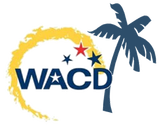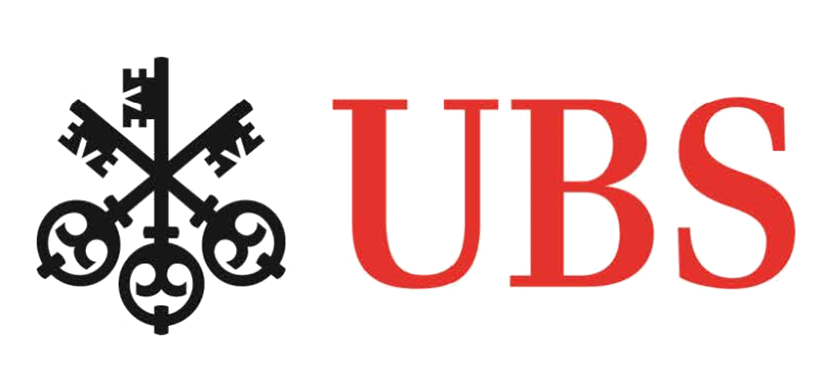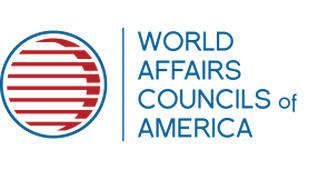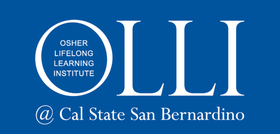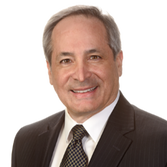
Michael Yaffe — November 14, 2021
"Will We See Peace in the Middle East in Our Lifetime?"
Dr. Michael Yaffe is the vice president of the Middle East North Africa Center at the U.S. Institute of Peace. He has an extensive background in the U.S. government, including serving as a senior advisor for Israeli-Palestinian Negotiations and Middle East Peace at the U.S. Department of State. Additionally, he was an academic dean and distinguished professor of strategic studies at the National Defense University from 2002 to 2012. Dr. Yaffe's career also involved significant contributions to Middle East peace negotiations, regional security, and counterterrorism efforts following the September 11, 2001 attacks. Throughout his career, he received numerous awards and commendations. Dr. Yaffe holds a doctorate, master's, and bachelor's degree and has published extensively on various topics related to the Middle East, Africa, security, arms control, non-proliferation, and diplomatic history.
"Will We See Peace in the Middle East in Our Lifetime?"
Dr. Michael Yaffe is the vice president of the Middle East North Africa Center at the U.S. Institute of Peace. He has an extensive background in the U.S. government, including serving as a senior advisor for Israeli-Palestinian Negotiations and Middle East Peace at the U.S. Department of State. Additionally, he was an academic dean and distinguished professor of strategic studies at the National Defense University from 2002 to 2012. Dr. Yaffe's career also involved significant contributions to Middle East peace negotiations, regional security, and counterterrorism efforts following the September 11, 2001 attacks. Throughout his career, he received numerous awards and commendations. Dr. Yaffe holds a doctorate, master's, and bachelor's degree and has published extensively on various topics related to the Middle East, Africa, security, arms control, non-proliferation, and diplomatic history.
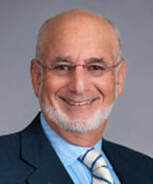
Richard Feinberg — December 5, 2021
"Will the End of the Castro Era Mean a Change for the People of Cuba or U.S.-Cuba relations?"
Richard Feinberg, an expert with extensive experience in United States foreign policy through his government services in the White House, Department of State, and Department of the Treasury, as well as roles in various Washington-based public policy institutes, corporate consulting, and as a professor of international political economy at the University of California, San Diego. He served as special assistant to President Clinton for National Security Affairs and senior director of the National Security Council's Office of Inter-American Affairs. Feinberg is renowned for his expertise in trade and investment, globalization, democratization, and non-governmental organizations, having authored over 200 books and articles on international relations. As a nonresident senior fellow at the Brookings Institution, he has written reports evaluating Cuba's economic reforms, foreign investment, private enterprise, and the emergence of the middle class, in addition to proposing solutions to U.S. property claims from the 1960s. One of his notable works is the book "Open for Business: Building the New Cuban Economy" published in 2016.
"Will the End of the Castro Era Mean a Change for the People of Cuba or U.S.-Cuba relations?"
Richard Feinberg, an expert with extensive experience in United States foreign policy through his government services in the White House, Department of State, and Department of the Treasury, as well as roles in various Washington-based public policy institutes, corporate consulting, and as a professor of international political economy at the University of California, San Diego. He served as special assistant to President Clinton for National Security Affairs and senior director of the National Security Council's Office of Inter-American Affairs. Feinberg is renowned for his expertise in trade and investment, globalization, democratization, and non-governmental organizations, having authored over 200 books and articles on international relations. As a nonresident senior fellow at the Brookings Institution, he has written reports evaluating Cuba's economic reforms, foreign investment, private enterprise, and the emergence of the middle class, in addition to proposing solutions to U.S. property claims from the 1960s. One of his notable works is the book "Open for Business: Building the New Cuban Economy" published in 2016.
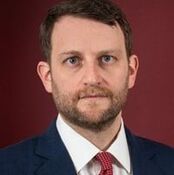
Yuval Weber — January 16, 2022
"Could US - Russia Relations Get Any Worse?"
Yuval Weber, PhD, is a Research Assistant Professor at Texas A&M's Bush School of Government and Public Service in Washington, DC, and holds the Bren Chair of Russian Military and Political Strategy at the Brute Krulak Center for Innovation and Creativity at Marine Corps University in Quantico, VA. He has an extensive academic background, previously serving as the Kennan Institute Associate Professor of Russian and Eurasian Studies at the Daniel Morgan Graduate School, as well as holding teaching positions at Harvard University and the Higher School of Economics in Moscow. Dr. Weber's research focuses on Russian and Eurasian security, political, and economic subjects, and he has published numerous works in academic journals and the popular press in both the United States and Russia. Currently, he is working on two projects, one involving the development of a tool to measure hierarchy and resilience in international affairs for analyzing great power competition, and the other examining the complexities between economic modernization and the security state in Russian political economy, with the latter manuscript slated for publication in 2021 by Agenda/Columbia UP.
"Could US - Russia Relations Get Any Worse?"
Yuval Weber, PhD, is a Research Assistant Professor at Texas A&M's Bush School of Government and Public Service in Washington, DC, and holds the Bren Chair of Russian Military and Political Strategy at the Brute Krulak Center for Innovation and Creativity at Marine Corps University in Quantico, VA. He has an extensive academic background, previously serving as the Kennan Institute Associate Professor of Russian and Eurasian Studies at the Daniel Morgan Graduate School, as well as holding teaching positions at Harvard University and the Higher School of Economics in Moscow. Dr. Weber's research focuses on Russian and Eurasian security, political, and economic subjects, and he has published numerous works in academic journals and the popular press in both the United States and Russia. Currently, he is working on two projects, one involving the development of a tool to measure hierarchy and resilience in international affairs for analyzing great power competition, and the other examining the complexities between economic modernization and the security state in Russian political economy, with the latter manuscript slated for publication in 2021 by Agenda/Columbia UP.

Julie Makinen — January 27, 2022
"What to Watch for in the China Winter Olympics, Both on the Field -- and Off"
Julie Makinen is the executive editor of The Desert Sun and California Editor for the USA Today Network, with oversight of nine newsrooms in the Western region owned by Gannett Co. Her extensive journalistic career includes serving as an editor for foreign news desks at The Washington Post and the Los Angeles Times, as well as being the deputy businesses editor for Asia at the International New York Times in Hong Kong. Julie's experiences also involve being the L.A. Times bureau chief in Beijing, reporting on East Asia, and holding roles in areas like Baghdad and Kabul. She has covered numerous countries, including North Korea, China, Japan, Afghanistan, and more. Julie is involved in various journalistic organizations and holds degrees in Human Biology from Stanford and East Asian Studies from UCLA.
"What to Watch for in the China Winter Olympics, Both on the Field -- and Off"
Julie Makinen is the executive editor of The Desert Sun and California Editor for the USA Today Network, with oversight of nine newsrooms in the Western region owned by Gannett Co. Her extensive journalistic career includes serving as an editor for foreign news desks at The Washington Post and the Los Angeles Times, as well as being the deputy businesses editor for Asia at the International New York Times in Hong Kong. Julie's experiences also involve being the L.A. Times bureau chief in Beijing, reporting on East Asia, and holding roles in areas like Baghdad and Kabul. She has covered numerous countries, including North Korea, China, Japan, Afghanistan, and more. Julie is involved in various journalistic organizations and holds degrees in Human Biology from Stanford and East Asian Studies from UCLA.
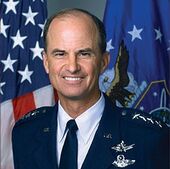
Kevin Chilton — February 20, 2022
"Role of Space in U.S. National Secrity"
Kevin Patrick "Chilli" Chilton is an American mechanical engineer and retired United States Air Force four-star general, test pilot, and NASA astronaut. His last assignment was as commander of U.S. Strategic Command from October 3, 2007, to January 28, 2011. Prior to his appointment to general officer ranks, Chilton spent 11 years of his military career as a NASA astronaut. He retired from the Air Force on February 1, 2011, after having achieved the highest rank of any military astronaut. On January 30, 2012, General Chilton was named to the board of directors of Orbital Sciences Corporation.
"Role of Space in U.S. National Secrity"
Kevin Patrick "Chilli" Chilton is an American mechanical engineer and retired United States Air Force four-star general, test pilot, and NASA astronaut. His last assignment was as commander of U.S. Strategic Command from October 3, 2007, to January 28, 2011. Prior to his appointment to general officer ranks, Chilton spent 11 years of his military career as a NASA astronaut. He retired from the Air Force on February 1, 2011, after having achieved the highest rank of any military astronaut. On January 30, 2012, General Chilton was named to the board of directors of Orbital Sciences Corporation.
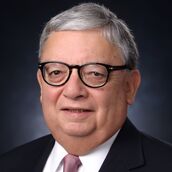
Albert Zapanta — February 22, 2022
"US - Mexico - Canada Trade"
Albert Zapanta is the President and CEO of the United States-Mexico Chamber of Commerce, overseeing its 10 regional offices in the U.S. and 9 in Mexico. He is also the Chairman and Owner of Planning, Inc., a long-standing human resources, training, and security company with extensive U.S. Federal Government business experience. Previously, he worked in upstream operations at Atlantic Richfield Co. (ARCO Oil & Gas) and retired as Director of Governmental Affairs, where he played a crucial role in negotiations with the U.S. and Mexican governments on oil and gas matters. His impressive career includes numerous Presidential appointments and notable military service with awards, such as the Silver Star and 5 Bronze Stars for Valor during the Vietnam War. Mr. Zapanta holds various positions on boards and committees, and he is an accomplished academic with degrees in Industrial Psychology, Public Administration, and nearly completing his PhD in International Political Economics from the University of Southern California.
"US - Mexico - Canada Trade"
Albert Zapanta is the President and CEO of the United States-Mexico Chamber of Commerce, overseeing its 10 regional offices in the U.S. and 9 in Mexico. He is also the Chairman and Owner of Planning, Inc., a long-standing human resources, training, and security company with extensive U.S. Federal Government business experience. Previously, he worked in upstream operations at Atlantic Richfield Co. (ARCO Oil & Gas) and retired as Director of Governmental Affairs, where he played a crucial role in negotiations with the U.S. and Mexican governments on oil and gas matters. His impressive career includes numerous Presidential appointments and notable military service with awards, such as the Silver Star and 5 Bronze Stars for Valor during the Vietnam War. Mr. Zapanta holds various positions on boards and committees, and he is an accomplished academic with degrees in Industrial Psychology, Public Administration, and nearly completing his PhD in International Political Economics from the University of Southern California.
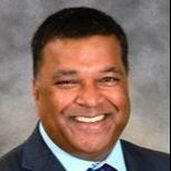
Satu Limaye — March 6, 2022
"India at Home and In the World"
Dr. Satu Limaye created and directs the Asia Matters for America initiative and is the founding editor of the Asia Pacific Bulletin. He is Senior Adviser, China & Indo-Pacific Division at the Center for Naval Analyses and Senior Fellow on Asia History and Policy at the Foreign Policy Institute at Paul H. Nitze School of International Studies. Limaye is a magna cum laude and Phi Beta Kappa graduate of Georgetown University and received his doctorate from Oxford University.
"India at Home and In the World"
Dr. Satu Limaye created and directs the Asia Matters for America initiative and is the founding editor of the Asia Pacific Bulletin. He is Senior Adviser, China & Indo-Pacific Division at the Center for Naval Analyses and Senior Fellow on Asia History and Policy at the Foreign Policy Institute at Paul H. Nitze School of International Studies. Limaye is a magna cum laude and Phi Beta Kappa graduate of Georgetown University and received his doctorate from Oxford University.
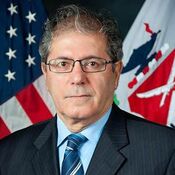
Kamal Beyoghlow — April 10, 2022
"Terrorism Financing"
Dr. Kamal Beyoghlow - Associate Professor of International Security and Cross Cultural Communication at the Elliott School of Internationals Affairs at George Washington University and is Associate Professor of the U.S. Intelligence Community and Homeland Security at the Department of Government at American University in Washington, D.C. He is a former tenured Professor of U.S. Grand Strategy and Policy and Resident Scholar on the Middle East, North Africa and Islamic Studies as well as Chair of the Department of Culture and Regional Studies at the U.S. National War College. He taught national security strategy at the Marine Corps Command and Staff College between 1992 and 2004 and from 2012 and until his U.S. Government retirement in 2014, he served as the U.S. Department of State Principal Representative to President Obama’s Periodic Review Board for the Guantanamo Terrorism Detention Facility.
"Terrorism Financing"
Dr. Kamal Beyoghlow - Associate Professor of International Security and Cross Cultural Communication at the Elliott School of Internationals Affairs at George Washington University and is Associate Professor of the U.S. Intelligence Community and Homeland Security at the Department of Government at American University in Washington, D.C. He is a former tenured Professor of U.S. Grand Strategy and Policy and Resident Scholar on the Middle East, North Africa and Islamic Studies as well as Chair of the Department of Culture and Regional Studies at the U.S. National War College. He taught national security strategy at the Marine Corps Command and Staff College between 1992 and 2004 and from 2012 and until his U.S. Government retirement in 2014, he served as the U.S. Department of State Principal Representative to President Obama’s Periodic Review Board for the Guantanamo Terrorism Detention Facility.
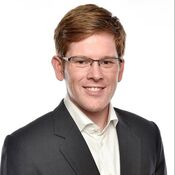
Pierson Clair — May 8, 2022
"Understanding the Risks and Future Role of Digital Currencies in our Global Financial Systems"
Pierson Clair shared real world examples of how cryptocurrency is both a helpful and potentially harmful technology. He is a Managing Director with Kroll's Cyber Risk (Cyber Security and Investigations) practice located in Los Angeles. A graduate of the University of Southern California, Mr. Clair blended studies in intelligence, espionage and terrorism from the school of International Relations with cyber-security and computer forensics from the Viterbi School of Engineering.
"Understanding the Risks and Future Role of Digital Currencies in our Global Financial Systems"
Pierson Clair shared real world examples of how cryptocurrency is both a helpful and potentially harmful technology. He is a Managing Director with Kroll's Cyber Risk (Cyber Security and Investigations) practice located in Los Angeles. A graduate of the University of Southern California, Mr. Clair blended studies in intelligence, espionage and terrorism from the school of International Relations with cyber-security and computer forensics from the Viterbi School of Engineering.
